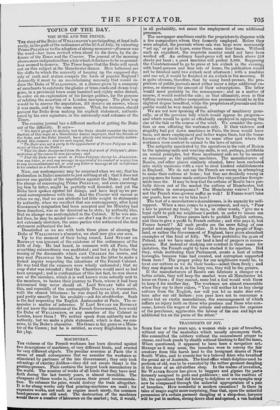MACHINERY.
Tux violence of the French workmen has been directed against two descriptions of machines, of very different kinds, and erected for very different objects. The peculiar aversion at Paris (for it seems of small consequence that we consider the workmen as stimulated by partisans of the late Government ; they only took advantage of existing dislikes—they did not create them) is the printing-presses. Paris contains the largest book manufactory in the world. The number of works of all kinds that they have sent forth during the last twenty years, is almost incredible. The cheapness of these works is, of course, their grand recommenda- tion. To enhance the price would destroy the trade altogether. It is for cheap works only flat printing-machines are used ; • for expensive works, and-such as require much nicety, the common hand-1resses are still used. The destruction of the machines WOW4 throw a number of labourers on the market; but, it would,'
in all probability, not cause the employment of one additional pressmen.
The newspaper machines enable the proprietors to dispense with a few compositors whom they formerly employed. Before they were adopted, the journals whose sale was large were necessarily "set up," or put in types, some three, some four times. Without such an expedient, the requisite number could not have been worked off. An ordinary hand-press will not finish above 250 sheets per hour ; a good machine will perfect 2,000. Supposing the Constitutionnel to go to press at ten o'clock in the evening, with hand-presses and four sets of forms, the publication would not be finished until two o'clock next afternoon ; with a machine and one set, it would be finished at six o'clock in the morning. It is quite obvious, therefore, that by using hand-presses, the pro- pnetors of public journals must either incur a large additional ex- pense, or increase the amount of their subscriptions. The latter would most probably be the consequence ; and as a matter of course, it would restrict the sale ; so that ultimately, even in this trifling instance, neither compositors nor pressmen would be in the slightest degree benefited, while the proprietors of journals and the public would be very much injured. We are not now speaking of the advantage of machinery gene- rally, or of the perverse folly which would oppose its progress— and which would be quite as effectually employed in opposing the rise of the tide or the course of the wind. We consider the ques- tion as one affecting the workmen only. If their violence and stupidity had put down machines in Paris, the issue would have been, not more employment and better wages there, but the trans- ference of the book-trade of Paris to some other spot where the workmen were content to submit to the laws of nature.
The antipathy manifested by the operatives in the vale of Rouen to the spinning-mills and weaving-mills, is not, perhaps, justifiable on sound principles, but these mechanical aids are by no means so necessary as the printing machines. The manufacturers of Rouiin, and other places similarly situated, have been cockered into sickly existence with a view to rival kindred establishments in England. We do not say the French are wrong in attempting to make their cottons at. home ; but they are decidedly wrong in paying more for home-made cottons than they can purchase foreign- made ones for. It may be true that the cottons of Rouiin have par- tially driven out of the market the cottons of Manchester, but who suffers in consequence ? The Manchester weaver? Does not the French wine-grower suffer,as well? If France won't take our goods, how are we to take hers ? • .
The test of a manufacture's desirableness, is its capacity for self- support. When a man comes to a government, and says, "Pass a law to protect my trade," he says, in other words, "give me a legal right to pick my neighbour's pocket, in order to insure me against losses." France passes laws to prohibit English cottons, and thus to give a profit to French cottons and who pays it, but France herself? All such profits are the mere filling of one pocket and emptying of the other. It is true, the people of Eng- land, or rather the Government of England, have given abundant examples of this kind of folly. We have prohibited the giain of Poland, and we have made our land a land of paupers in conse- quence. But insteadof studying our conduct in these cases for imitation, the French ought to have studied it for rejection. Did they, while instituting their Parliament, create a host of rotten boroughs, because time had created, and corruption supported them here ? The proper policy for our neighbours would be, to treat our cottons as we do their books—admit them freely ; and they may depend on it, in the long run, they will be the gainers. If the manufacturers of Rouen can fabricate a cheaper or a better article, they will keep the market were all Manchester let loose on them ; if they cannot, none but a fool would wish them to keep it for, another day. The workmen are almost reasonable when they say to their rulers, "You will neither let us buy cheap cottons from the English, nor will you let us make dear cot- tons after our old fashion : you pass laws not to encourage a native but an exotic manufacture, the encouragement of which inflicts an injury both on those who produce and those who con- sume, lowers the wages of the artisan and enhances the expense of the purchaser, aggravates the labour of the one and lays an additional tax on the purse of the other."


























 Previous page
Previous page